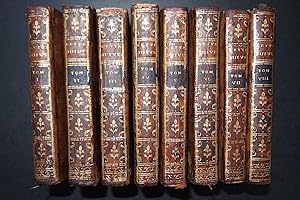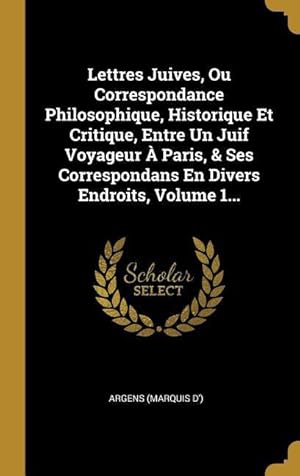Lettres juives ou correspondance philosophique, historique et critique entre un Juif voyageur à Paris et ses correspondans divers endroits (4 Ergebnisse)
Produktart
- Alle Produktarten
- Bücher (4)
- Magazine & Zeitschriften
- Comics
- Noten
- Kunst, Grafik & Poster
- Fotografien
- Karten
-
Manuskripte &
Papierantiquitäten
Zustand
Einband
- alle Einbände
- Hardcover (3)
- Softcover
Weitere Eigenschaften
- Erstausgabe (1)
- Signiert
- Schutzumschlag
- Angebotsfoto (2)
Land des Verkäufers
Verkäuferbewertung
-
Lettres juives, ou correspondance philosophique, historique, et critique, entre un Juif voyageur à Paris & ses correspondans en divers endroits
Verlag: Chez Pierre Paupie, 1764
Buch
Couverture rigide. - Chez Pierre Paupie, à La Haye 1764, 8 tomes en 8 vol. pet. in-12 (8x14,5cm), (2) xxiv 347pp. et (2) iv, 365pp. et (2) viij, 368pp. et (2) xxviij, 391pp. et (2) xxij, 357pp. et (2) xx, 376pp. et (2) 298pp. et (2) 390pp. (1), relié. - Nouvelle édition, après l'originale parue en 1736/37 chez le même éditeur, mais qui ne contenait que 180 lettres contre 203 pour les suivantes. La table des matières occupe l'espace du dernier volume. Reliure en plein veau blond d'époque. Dos lisse orné. Pièces de titre en maroquin rouge et de tomaison en maroquin noir. Coiffes de tête des tomes II, III, et IV manquantes. Frottements et épidermures sur quelques plats. Quelques coins émoussés. Assez bon ensemble. Les Lettres juives sont la première contribution littéraire de Boyer d'Argens après sa carrière militaire et son livre le plus remarquable par sa fantaisie et sa verve. L'ouvrage fut à l'origine un périodique, les lettres paraissaient régulièrement. Un juif voyageur en Europe fait part de ses observations et de ses réflexions à ses amis juifs, selon un modèle assez en vogue à cette époque et qu'emploiera en premier Marana dans L'espion turc en 1684, puis Montesquieu dans les Lettres Persanes en 1721. L'ensemble donne lieu à une élégante satire de la société et des moeurs de l'époque. Le volume V est dédié à Sancho Panza, le sixième au barbier de Don Quichotte. Il n'en reste pas moins qu'il souffle sur l'oeuvre un vent tout à fait philosophique et critique, et c'est le souffle des Lumières, celui qu'on retrouvera dans l'esprit de Diderot et de Voltaire et qui s'interroge sur la perception des choses, l'opinion et la vérité. [ENGLISH DESCRIPTION ON DEMAND] (2) xxiv 347pp. et (2) iv, 365pp. et (2) viij, 368pp. et (2) xxviij, 391pp. et (2) xxij, 357pp. et (2) xx, 376pp. et (2) 298pp. et (2) 390pp. (1).
-
LETTRES JUIVES, ou correspondance philosophique, historique, et critique, entre un juif voyageur à Paris & ses correspondans en divers endroits.
Verlag: A la Haye chez Pierre Paupie -37, 1736
Anbieter: Christopher Edwards ABA ILAB, Henley-on-Thames, OXON, Vereinigtes Königreich
Six volumes, 8vo in fours, a complete set of 180 numbers, each of 8pp. but continuously paginated; pp. [viii], 240; [viii], 240; [viii], '260' (actually 240); xvi, 240; [xvi], 240, [xvi], 244; a very good set in contemporary calf, all with red and green morocco labels (a little faded and slightly rubbed; two headcaps a bit chipped); red edges, marbled endpapers. The very rare first edition of this series of letters supposedly by a Jewish traveller called Aaron Monceca, commenting on the culture and politics of contemporary France: the immediate inspiration was of course Montesquieu's Lettres Persanes (1721), which had used the same light disguise. D'Argens (1704-71) came from a prosperous and respectable provençal family, but rejected the family's strict adherence to the church, and also his training in the law. In the mid-1730s he moved to the low countries and began a career as a writer: this was his first important work. Subsequently he became friendly with Voltaire, and in the early 1740s moved to Berlin and the court of Frederick the Great. The Lettres Juives consist of 180 eight-page letters, issued in periodical numbers at a rate of two per week, on Monday and Thursday: each number has an imprint - the first seven are dated 1735, as publication actually began in December of that year. The title pages and prefaces were supplied free as each volume was completed. Although there were several later editions, and indeed an almost contemporaneous reprint in Amsterdam by Paul Gautier, complete sets must be regarded as very uncommon. Cioranescu 8303. The BnF's online catalogue claims that only the first six letters are dated 1735, but the seventh in this set also has 1735 in its colophon.
-
Lettres Juives, Ou Correspondance Philosophique, Historique Et Critique, Entre Un Juif Voyageur À Paris, & Ses Correspondans En Divers Endroits, Volum
Verlag: WENTWORTH PR, 2018
ISBN 10: 0274932520ISBN 13: 9780274932528
Anbieter: moluna, Greven, Deutschland
Buch
Zustand: New.
-
Lettres juives, ou Correspondance philosophique, historique, et critique, entre un juif voyageur à Paris et ses correspondans en divers endroits (Jewish Letters, or Philosophical, Historical, and Critical Correspondence between a Jewish Traveler in Paris and His Correspondents in Various Locations) [FIRST EDITION OF THE AUTHOR'S FIRST BOOK]
Verlag: Pierre Paupie, The Hague, 1736
Anbieter: ERIC CHAIM KLINE, BOOKSELLER (ABAA ILAB), Santa Monica, CA, USA
Erstausgabe
Hardcover. Zustand: Very Good+. First edition. Six volumes (published between 1736 and 1737), octavo in 4s. [8], 240; [8], 240; [8], 240; [16], 240; [16], 240; [16], 244pp. Contemporary polished and speckled calf; spines with raised bands, elaborately tooled and lettered in gilt; dentelles. Light wear at corners, mild chafing at a few covers. Bookplates, old owner entry at free endleaves. An attractive set, with crisp, clean text, handsomely bound. Collation: (vol.1) [asterisk]4, A-Gg4 (= 124 leaves); (vol.2) [asterisk]4, A-Gg4 (= 124 leaves); (vol.3) [asterisk]4, A-Gg4 (= 124 leaves); (vol.4) [asterisk]8, A-Gg4 (= 128 leaves); (vol.5) [asterisk]8, A-Gg4 (= 128 leaves); (vol.6) [asterisk]8, A6, B-Gg4 (= 130 leaves) First edition of the author's first book. "A young diplomat and soldier from the Provence, the Marquis d'Argens (1703-1771) left his native country to live in Holland among her philosophes and littérateurs; there he wrote his first book -- the Lettres juives. Later in Berlin, as a member of the French entourage which Frederick the Great had assembled, he served as director of the philosophical section of the Prussian Academy. His Lettres juives, a fictitious correspondence between prominent Jews, show d'Argens' interest in Spinoza, evidenced also in many of his subsequent works [La philosophie du bons-sens, 1737; Mémoires secrets, 1744; Lettres chinoises, 1739-1740]" (Bamberger). An enlarged edition of the Lettres appeared in 1764; an English version appeared in 1739-1740 as The Jewish Spy. Jonathan Israel describes d'Argens as "[o]ne of the most widely read radical deist writers of Early Enlightenment Europe, an author steeped in Bayle and Spinoza, a born rebel, unrelentingly hostile to the European status quo, if not politically then certainly in everything concerning thought and belief." According to his own Memoires, d'Argens' philosophical odyssey "began in 1727 in Constantinople, where he lived for some time and was converted to a philosophical cast of mind by a sophisticated Sephardic Jew and a formidable Armenian who had lived in Amsterdam where he had become a 'grand Spinosiste.'" Throughout his life D'Argens "nurtured a strongly philo-Semitic attitude, at least regarding such emancipated and culturally sophisticated Sephardic Jews as he had met in Venice and Holland, and deliberately deploys the term 'Jew' polemically to designate individuals who have escaped the bondage of theological ways of thinking." In a remarkable passage within his Lettres Juives, d'Argens "has his Sephardic interlocutor comically report to his rabbinic correspondent in Constantinople that he has discovered in Paris 'un nombre infini de Juifs qui le sont, sans croire l'être, et sans en rien savoir' [an infinite number of Jews who are (philosophical deists), without believing they are, and without knowing anything about it" (Israel). Provenance: engraved bookplate of Marston House at the front paste-downs. References: Cf. Caillet 1606 (ed. 1754). Cf. Bamberger 340 (ed. Amsterdam: P. Gautier). For d'Argens, see J. Israel, Radical Enlightenment (O.U.P., 2001), esp. pp. 586-90.




